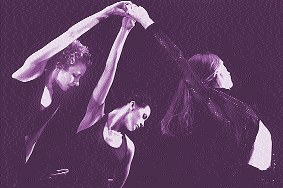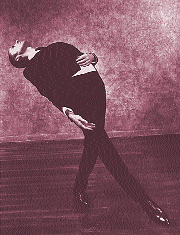Complex paths
Eleanor Brickhill responds to new works by Sue Healy for One Extra and Trevor Patrick at Greenmill

Nicole Johnston, Michelle Heaven and Luke Smiles in Suite Slip’d
photo Brendan Read
Nicole Johnston, Michelle Heaven and Luke Smiles in Suite Slip’d
The idea behind Green Mill’s 1997 program, Heritage and Heresy, is timely. There’s a feeling in the air; dancers looking back to see their tracks stretching behind them into the distance. Perhaps they seek proof that they’ve really gone somewhere. The subject matter of much recent work, at Green Mill and in Sydney, is indeed lived history, and we’re shown these tracks, paths of complex endeavour, entwining personal and professional experience, a detailed and private history of growing up and settling in, an embodiment of craft.
Sue Healey’s own history starts with ballet. In June, The One Extra Company presented her Suite Slip’d at The Performance Space, but I was happy to have seen it first in rehearsal a week earlier, prior to the addition of costumes and set. There’s something special in the fearlessness and ease of rehearsal, where sequences and physical relationships are still somewhat open-ended, without the fixity that performance requires. In the first trio, the dancers took the behavioural and stylistic elegance of 17th century French court dance, throwing it (and each other) around the spacious bare studio, with a quick, sweet understatement which belied the fast, slippery complicated precision demanded by the choreography. For someone who knows ballet, a slight tilt of the chin, a glancing epaulement, a sudden flutter of hands, all embody a world of meaning, both then and now, within which the dancers’ social and professional lives are played out.
The second half presented a kind of dramatic confrontation: two new dancers, new style, new material. With the addition of set and costumes in performance, I could barely shake the Sharks and the Jets out of my head, as subtle posture became a social currency no less extreme than that of 17th century. Both choreography and dancing in the first section were hard to fault, and while the suggestion of dramatic narrative might have been a persuasive guide, I preferred the more ‘abstract’ interrogation of dancerly ritual which was becoming visible prior to the complications presented by staging for performance.

Trevor Patrick in Leap of Faith
photo Jeff Busby
Trevor Patrick in Leap of Faith
Some works at Green Mill seemed to embody a kind of artistic coming of age. Trevor Patrick’s solo, Continental Drift, was one of these, performed as part of Dancework’s presentation of Leap of Faith. The weight and pathos of this work catches you by stealth. Small words, phrases, gestures accumulate and pack down, like strata in a land mass. He shifts sideways, black-suited, across the stage, backed by burnt orange screens. He bumps up against shadow, unknown experience, until it recedes. His movement is clean, the text simple but pervasive. He speaks of experience, events which just happen, ways of learning to do and to be; progress through life is measured by an accumulation of such events, which by themselves do not provide actual direction. The shape of his life becomes simply doing what he has done, going where he has gone, “dense episodes of experience” packing down into a pathway of sorts. When the other side of the stage is reached, the end of the road, he has cleared that space of shadow, and the ground is firm, marking a place of experience, for us as well, between the sacred and the profane.
–
Suite Slip’ed, by Sue Healey, The One Extra Company, The Performance Space, June–July 1997
Continental Drift, by Trevor Patrick, part of Dancework’s Leap of Faith, Green Mill Festival, June–July 1997
RealTime issue #20 Aug-Sept 1997 pg. 40






